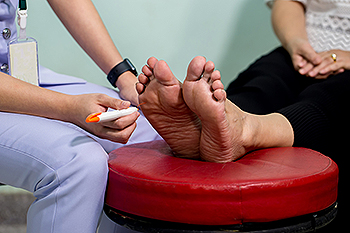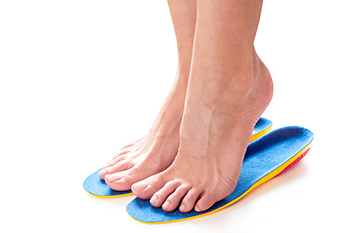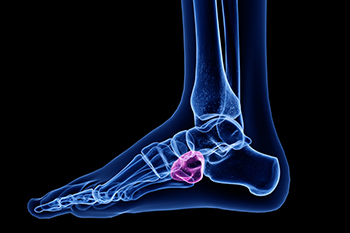Blog
Walking and Weight Loss May Help Arthritic Patients
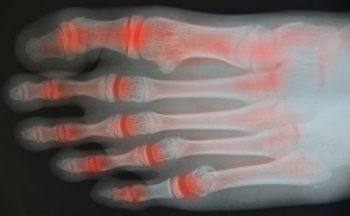
Some people who are afflicted with arthritis have found it beneficial to start a walking program. In addition to improving foot care, walking is good for maintaining heart health and strong bones. Additionally, weight loss is a benefit of walking, and this may help to lessen pressure on the joints of the feet. Research has shown that walking may help to reduce inflammation, pain, and stiffness from certain arthritic conditions. It is important to walk frequently, gradually increasing intensity and enforcing a minimum time limit of 30 minutes. Many people choose to split their walking mileage and time between days, and this can make it easier to stick with a walking program. If you would like more information about how walking can help arthritis, please consult with a podiatrist who can answer any questions you may have.
Arthritis can be a difficult condition to live with. If you are seeking treatment, contact one of our podiatrists from The Podiatry Center, PC. Our doctors can provide the care you need to keep you pain-free and on your feet.
Arthritic Foot Care
Arthritis is a term that is commonly used to describe joint pain. The condition itself can occur to anyone of any age, race, or gender, and there are over 100 types of it. Nevertheless, arthritis is more commonly found in women compared to men, and it is also more prevalent in those who are overweight. The causes of arthritis vary depending on which type of arthritis you have. Osteoarthritis for example, is often caused by injury, while rheumatoid arthritis is caused by a misdirected immune system.
Symptoms
- Swelling
- Pain
- Stiffness
- Decreased Range of Motion
Arthritic symptoms range in severity, and they may come and go. Some symptoms stay the same for several years but could potentially get worse with time. Severe cases of arthritis can prevent its sufferers from performing daily activities and make walking difficult.
Risk Factors
- Occupation – Occupations requiring repetitive knee movements have been linked to osteoarthritis
- Obesity – Excess weight can contribute to osteoarthritis development
- Infection – Microbial agents can infect the joints and trigger arthritis
- Joint Injuries – Damage to joints may lead to osteoarthritis
- Age – Risk increases with age
- Gender –Most types are more common in women
- Genetics – Arthritis can be hereditary
If you suspect your arthritis is affecting your feet, it is crucial that you see a podiatrist immediately. Your doctor will be able to address your specific case and help you decide which treatment method is best for you.
If you have any questions, please feel free to contact our office located in Millburn, NJ . We offer the newest diagnostic and treatment technologies for all your foot care needs.
Is Arthritis Causing My Ankle Pain?
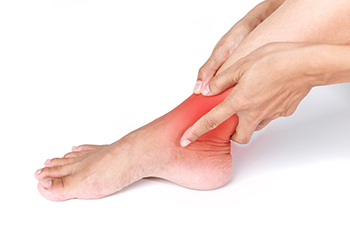
You may have pain in the ankle joint, where the shinbone or tibia rests on the top foot bone or talus. If you have arthritis in this joint, you will often experience pain, swelling, stiffness, and difficulty walking or moving your ankle freely. This type of arthritis may develop from an old injury, like a previous fracture, or rheumatoid arthritis (RA). If you have arthritis in your ankle, you might benefit from resting your ankle, or exercising in ways that put less stress on the ankle, like swimming or cycling. Because there are many possible reasons for ankle pain, visiting a podiatrist for an evaluation is suggested. A podiatrist will examine your feet and legs, observe your walking, check the pattern of wear on your shoes, and/or perform imaging tests.
Ankle pain can be caused by a number of problems and may be potentially serious. If you have ankle pain, consult with one of our podiatrists from The Podiatry Center, PC. Our doctors will assess your condition and provide you with quality foot and ankle treatment.
Ankle pain is any condition that causes pain in the ankle. Due to the fact that the ankle consists of tendons, muscles, bones, and ligaments, ankle pain can come from a number of different conditions.
Causes
The most common causes of ankle pain include:
- Types of arthritis (rheumatoid, osteoarthritis, and gout)
- Ankle sprains
- Broken ankles
- Achilles tendinitis
- Achilles tendon rupture
- Stress fractures
- Bursitis
- Tarsal tunnel syndrome
- Plantar fasciitis
Symptoms
Symptoms of ankle injury vary based upon the condition. Pain may include general pain and discomfort, swelling, aching, redness, bruising, burning or stabbing sensations, and/or loss of sensation.
Diagnosis
Due to the wide variety of potential causes of ankle pain, podiatrists will utilize a number of different methods to properly diagnose ankle pain. This can include asking for personal and family medical histories and of any recent injuries. Further diagnosis may include sensation tests, a physical examination, and potentially x-rays or other imaging tests.
Treatment
Just as the range of causes varies widely, so do treatments. Some more common treatments are rest, ice packs, keeping pressure off the foot, orthotics and braces, medication for inflammation and pain, and surgery.
If you have any questions, please feel free to contact our office located in Millburn, NJ . We offer the newest diagnostic and treatment technologies for all your foot care needs.
Reminder: When Was the Last Time...?
Grading the Severity of a Sprained Ankle
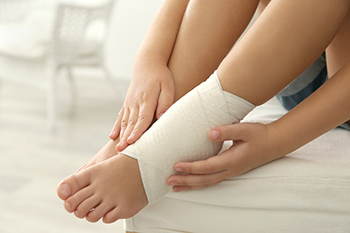
Ankle sprains are injuries that affect many people, regardless of how active or inactive they may be. Ankle sprains occur when one or more of the strong ligaments that support and bind the ankle become stretched beyond their normal bounds, or even torn in severe cases. This injury causes varying degrees of pain, swelling, and mobility issues which are graded by severity. Grade 1 ankle sprains cause mild pain and swelling, and there is no visible bruising, joint instability, or difficulty bearing weight. Ligaments are minimally stretched, so recovery time generally falls within one to three weeks. With a grade 2 ankle sprain the pain, swelling, and tenderness can range from mild to moderate. There may be some joint instability and bruising. Bearing weight may be painful, and it may be difficult to move the ankle. The recovery time typically doubles, because the ligament has been partially torn. A grade 3 ankle sprain is the most severe because the ligament(s) have torn fully or ruptured. This causes severe pain, swelling, bruising, and tenderness. It is impossible to walk due to the ankle being considerably unstable and unable to bear weight. Also, a grade 3 ankle sprain can take several months to fully heal. If you believe you have sprained your ankle, make an appointment with a podiatrist as soon as possible.
Ankle sprains are common but need immediate attention. If you need your feet checked, contact one of our podiatrists from The Podiatry Center, PC. Our doctors can provide the care you need to keep you pain-free and on your feet.
How Does an Ankle Sprain Occur?
Ankle sprains take place when the ligaments in your ankle are torn or stretched beyond their limits. There are multiple ways that the ankle can become injured, including twisting or rolling over onto your ankle, putting undue stress on it, or causing trauma to the ankle itself.
What Are the Symptoms?
- Mild to moderate bruising
- Limited mobility
- Swelling
- Discoloration of the skin (depending on severity)
Preventing a Sprain
- Wearing appropriate shoes for the occasion
- Stretching before exercises and sports
- Knowing your limits
Treatment of a Sprain
Treatment of a sprain depends on the severity. Many times, people are told to rest and remain off their feet completely, while others are given an air cast. If the sprain is very severe, surgery may be required.
If you have suffered an ankle sprain previously, you may want to consider additional support such as a brace and regular exercises to strengthen the ankle.
If you have any questions please feel free to contact our office located in Millburn, NJ . We offer the newest diagnostic and treatment technologies for all your foot and ankle needs.
Exercises Can Help Improve Balance

Many people begin to develop balance problems as they age, putting them at a higher risk of falling. A few simple exercises can be done at home to improve health and mobility. (If you haven’t done any exercise in a while, it is always a good idea to check in with a health professional before embarking on any new program.) Just to be safe during these simple exercises, be sure to stand near a wall or chair, or keep a walking aid nearby before starting. It’s a good idea to start cautiously, building up the number of repetitions gradually to avoid injury. Heel-to-toe walk: Place the heel of your right foot directly in front of your left, looking straight ahead, and step down. Repeat 5 times. You may need to lightly touch the wall for stability. One-leg stand: Stand facing the wall, arms straight out in front, and lightly touch the wall in front of you. Lift one foot off the floor and hold for 5 -10 seconds. Repeat with the other foot. Do this 3 times. Sideways walking: Stand up straight with both feet together. Step out to the side with one foot, transfer your weight, and bring the other foot next to it. Repeat 10 steps. Then reverse direction. If you continue to experience balance problems, it may be a good idea to check in with a podiatrist for a complete biomechanical evaluation.
Preventing falls among the elderly is very important. If you are older and have fallen or fear that you are prone to falling, consult with one of our podiatrists from The Podiatry Center, PC. Our doctors will assess your condition and provide you with quality advice and care.
Every 11 seconds, an elderly American is being treated in an emergency room for a fall related injury. Falls are the leading cause of head and hip injuries for those 65 and older. Due to decreases in strength, balance, senses, and lack of awareness, elderly persons are very susceptible to falling. Thankfully, there are a number of things older persons can do to prevent falls.
How to Prevent Falls
Some effective methods that older persons can do to prevent falls include:
- Enrolling in strength and balance exercise program to increase balance and strength
- Periodically having your sight and hearing checked
- Discuss any medications you have with a doctor to see if it increases the risk of falling
- Clearing the house of falling hazards and installing devices like grab bars and railings
- Utilizing a walker or cane
- Wearing shoes that provide good support and cushioning
- Talking to family members about falling and increasing awareness
Falling can be a traumatic and embarrassing experience for elderly persons; this can make them less willing to leave the house, and less willing to talk to someone about their fears of falling. Doing such things, however, will increase the likelihood of tripping or losing one’s balance. Knowing the causes of falling and how to prevent them is the best way to mitigate the risk of serious injury.
If you have any questions, please feel free to contact our office located in Millburn, NJ . We offer the newest diagnostic and treatment technologies for all your foot care needs.
Why Live with Pain and Numbness in Your Feet?
Dealing With Cracked Heels
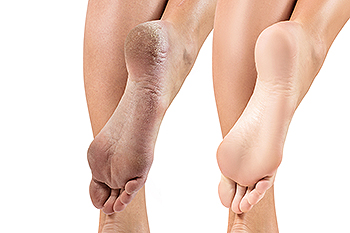 Cracked heels are dry, thick skin that forms on the heels of the feet. It is an unsightly look and can be uncomfortable. Cracked heels or calluses can develop when the fat pad under the heels of your feet expands while walking. This condition can also result from standing for prolonged periods of time, walking barefoot, taking hot showers, using products that strip the skin of its natural oils, or from severe weather conditions. One can try moisturizing home remedies, such as a honey and water scrub or olive oil or petroleum jelly gently massaged into the feet. If the problem persists or worsens, an appointment with a podiatrist should be made to be evaluated and to receive the appropriate treatment.
Cracked heels are dry, thick skin that forms on the heels of the feet. It is an unsightly look and can be uncomfortable. Cracked heels or calluses can develop when the fat pad under the heels of your feet expands while walking. This condition can also result from standing for prolonged periods of time, walking barefoot, taking hot showers, using products that strip the skin of its natural oils, or from severe weather conditions. One can try moisturizing home remedies, such as a honey and water scrub or olive oil or petroleum jelly gently massaged into the feet. If the problem persists or worsens, an appointment with a podiatrist should be made to be evaluated and to receive the appropriate treatment.
If the skin on your feet starts to crack, you may want to see a podiatrist to find treatment. If you have any concerns, contact one of our podiatrists from The Podiatry Center, PC. Our doctors can provide the care you need to keep you pain-free and on your feet.
Cracked Heels
It is important to moisturize your cracked heels in order to prevent pain, bleeding, and infection. The reason cracked heels form is because the skin on the foot is too dry to support the immense pressure placed on them. When the foot expands, the dry skin on the foot begins to split.
Ways to Help Heal Them
- Invest in a good foot cream
- Try Using Petroleum Jelly
- Ease up on Soaps
- Drink Plenty of Water
Ways to Prevent Cracked Heels
- Moisturize After Showering
- Skip a Shower
- Keep Shower Water Lukewarm
- Don’t Scrub Your Feet
If you are unsure how to proceed in treating cracked heels, seek guidance from a podiatrist. Your doctor will help you with any questions or information you may need.
If you have any questions, please feel free to contact our office located in Millburn, NJ . We offer the newest diagnostic and treatment technologies for all your foot care needs.
When Neuropathy Affects the Feet
Neuropathy can generally be referred to as a disease or dysfunction of the nerves. There are different forms of neuropathy which can occur in various locations of the body. When neuropathy affects the feet, it is a malfunction within the peripheral nervous system—which is a network of nerves outside of the central nervous system (comprising the spinal cord and brain) which controls the feet, hands, legs, and arms. This type of neuropathy is referred to as peripheral neuropathy. Neuropathy can be caused by diabetes, autoimmune diseases, infections, alcoholism, genetic disorders, toxins, medications, tumors, and more. Sometimes there is no known cause for neuropathy. Peripheral neuropathy can cause numbness, tingling, pain, or extreme sensitivity to touch in the feet. It may even cause a loss of feeling in the feet which may lead to an inability to detect rapidly developing sores. If you have any of these symptoms, see a podiatrist as soon as possible to devise an appropriate treatment plan.
Neuropathy
Neuropathy can be a potentially serious condition, especially if it is left undiagnosed. If you have any concerns that you may be experiencing nerve loss in your feet, consult with one of our podiatrists from The Podiatry Center, PC. Our doctors will assess your condition and provide you with quality foot and ankle treatment for neuropathy.
What Is Neuropathy?
Neuropathy is a condition that leads to damage to the nerves in the body. Peripheral neuropathy, or neuropathy that affects your peripheral nervous system, usually occurs in the feet. Neuropathy can be triggered by a number of different causes. Such causes include diabetes, infections, cancers, disorders, and toxic substances.
Symptoms of Neuropathy Include:
- Numbness
- Sensation loss
- Prickling and tingling sensations
- Throbbing, freezing, burning pains
- Muscle weakness
Those with diabetes are at serious risk due to being unable to feel an ulcer on their feet. Diabetics usually also suffer from poor blood circulation. This can lead to the wound not healing, infections occurring, and the limb may have to be amputated.
Treatment
To treat neuropathy in the foot, podiatrists will first diagnose the cause of the neuropathy. Figuring out the underlying cause of the neuropathy will allow the podiatrist to prescribe the best treatment, whether it be caused by diabetes, toxic substance exposure, infection, etc. If the nerve has not died, then it’s possible that sensation may be able to return to the foot.
Pain medication may be issued for pain. Electrical nerve stimulation can be used to stimulate nerves. If the neuropathy is caused from pressure on the nerves, then surgery may be necessary.
If you have any questions, please feel free to contact our office located in Millburn, NJ . We offer the newest diagnostic and treatment technologies for all your foot care needs.
Do Your Child's Feet Hurt?
Flat Feet and Orthotics
Many people are born with flat feet. There may be additional causes for flat feet to develop that can include pregnancy, arthritis, diabetes, or even an injury. Orthotics are custom made inserts that are designed to fit inside shoes. Research has indicated that wearing orthotics may help patients with flat feet. The benefits of wearing orthotics can include shock absorption, improved balance, and support for the arch and heel. Additionally, orthotics may reduce existing pain that some patients experience because of flat feet. If you have this condition, and are interested in learning more about how orthotics can help you, please consult with a podiatrist.
If you are having discomfort in your feet and would like to try orthotics, contact one of our podiatrists from The Podiatry Center, PC. Our doctors can provide the care you need to keep you pain-free and on your feet.
What Are Orthotics?
Orthotics are inserts you can place into your shoes to help with a variety of foot problems such as flat feet or foot pain. Orthotics provide relief and comfort for minor foot and heel pain but can’t correct serious biomechanical problems in your feet.
Over-the-Counter Inserts
Orthotics come in a wide variety of over-the-counter inserts that are used to treat foot pain, heel pain, and minor problems. For example, arch supports can be inserted into your shoes to help correct overarched or flat feet, while gel insoles are often used because they provide comfort and relief from foot and heel pain by alleviating pressure.
Prescription Orthotics
If over-the-counter inserts don’t work for you or if you have a more severe foot concern, it is possible to have your podiatrist prescribe custom orthotics. These high-quality inserts are designed to treat problems such as abnormal motion, plantar fasciitis, and severe forms of heel pain. They can even be used to help patients suffering from diabetes by treating foot ulcers and painful calluses and are usually molded to your feet individually, which allows them to provide full support and comfort.
If you are experiencing minor to severe foot or heel pain, it’s recommended to speak with your podiatrist about the possibilities of using orthotics. A podiatrist can determine which type of orthotic is right for you and allow you to take the first steps towards being pain-free.
If you have any questions please contact our office located in Millburn, NJ . We offer the newest diagnostic and treatment technologies for all your foot and ankle needs.
More...
Can Hammertoe be Corrected?
 The most common symptom of hammertoe is when the toe(s) bends or curls downward instead of pointing forward. This deformity can occur as a result of having arthritis, wearing shoes that do not fit correctly, or from a toe injury. Patients can develop this condition from genetic factors or from having corns or bunions. Hammertoe can cause difficulty in walking, and it may cause pain when the toes are wiggled. A proper diagnosis is necessary in determining the severity of the condition. This is accomplished by performing a physical examination or by having an X-ray taken. Mild relief may be found when a protective covering is worn over the affected toe. Additionally, surgery may be necessary if the toe is unable to move. Surgery can be successful in restoring full range of motion, realigning the tendons and joints, and to remove the injured or deformed bone. If you have a hammertoe, it is suggested that you consult with a podiatrist who can offer proper treatment solutions.
The most common symptom of hammertoe is when the toe(s) bends or curls downward instead of pointing forward. This deformity can occur as a result of having arthritis, wearing shoes that do not fit correctly, or from a toe injury. Patients can develop this condition from genetic factors or from having corns or bunions. Hammertoe can cause difficulty in walking, and it may cause pain when the toes are wiggled. A proper diagnosis is necessary in determining the severity of the condition. This is accomplished by performing a physical examination or by having an X-ray taken. Mild relief may be found when a protective covering is worn over the affected toe. Additionally, surgery may be necessary if the toe is unable to move. Surgery can be successful in restoring full range of motion, realigning the tendons and joints, and to remove the injured or deformed bone. If you have a hammertoe, it is suggested that you consult with a podiatrist who can offer proper treatment solutions.
Hammertoe
Hammertoes can be a painful condition to live with. For more information, contact one of our podiatrists from The Podiatry Center, PC. Our doctors will answer any of your foot- and ankle-related questions.
Hammertoe is a foot deformity that affects the joints of the second, third, fourth, or fifth toes of your feet. It is a painful foot condition in which these toes curl and arch up, which can often lead to pain when wearing footwear.
Symptoms
- Pain in the affected toes
- Development of corns or calluses due to friction
- Inflammation
- Redness
- Contracture of the toes
Causes
Genetics – People who are genetically predisposed to hammertoe are often more susceptible
Arthritis – Because arthritis affects the joints in your toes, further deformities stemming from arthritis can occur
Trauma – Direct trauma to the toes could potentially lead to hammertoe
Ill-fitting shoes – Undue pressure on the front of the toes from ill-fitting shoes can potentially lead to the development of hammertoe
Treatment
Orthotics – Custom made inserts can be used to help relieve pressure placed on the toes and therefore relieve some of the pain associated with it
Medications – Oral medications such as anti-inflammatories or NSAIDs could be used to treat the pain and inflammation hammertoes causes. Injections of corticosteroids are also sometimes used
Surgery – In more severe cases where the hammertoes have become more rigid, foot surgery is a potential option
If you have any questions please contact our office located in Millburn, NJ . We offer the newest diagnostic and treatment technologies for all your foot and ankle needs.
Wounds That Don't Heal Need to Be Checked
What Might Cause Pain in the Middle, Outside Part of the Foot?
Cuboid syndrome occurs when the cuboid bone—located on the outer side of the foot, between the heel and the pinky toe—shifts out of its normal position. This typically occurs abruptly, sometimes along with an ankle sprain, or by landing on a hard surface. Sometimes wearing high heels or shoes that do not fit correctly or failing to stretch the feet properly before physical activity can cause cuboid syndrome, as well as certain conditions such as having flat feet or tendon problems. Cuboid syndrome can cause pain, tenderness, swelling, and weakness on the outside of the middle of the foot and may even prevent normal movement of the foot. If you are experiencing these types of symptoms, see a podiatrist for an examination and diagnosis. If you do have cuboid syndrome, your podiatrist can treat it through physical therapy, taping, bracing, or in some cases—after swelling and pain have lessened—a maneuver called the cuboid whip to help guide your cuboid bone back into position.
Cuboid syndrome, also known as cuboid subluxation, occurs when the joints and ligaments near the cuboid bone in the foot become torn. If you have cuboid syndrome, consult with one of our podiatrists from The Podiatry Center, PC. Our doctors will assess your condition and provide you with quality foot and ankle treatment.
Cuboid syndrome is a common cause of lateral foot pain, which is pain on the outside of the foot. The condition may happen suddenly due to an ankle sprain, or it may develop slowly overtime from repetitive tension through the bone and surrounding structures.
Causes
The most common causes of cuboid syndrome include:
- Injury – The most common cause of this ailment is an ankle sprain.
- Repetitive Strain – Tension placed through the peroneus longus muscle from repetitive activities such as jumping and running may cause excessive traction on the bone causing it to sublux.
- Altered Foot Biomechanics – Most people suffering from cuboid subluxation have flat feet.
Symptoms
A common symptom of cuboid syndrome is pain along the outside of the foot which can be felt in the ankle and toes. This pain may create walking difficulties and may cause those with the condition to walk with a limp.
Diagnosis
Diagnosis of cuboid syndrome is often difficult, and it is often misdiagnosed. X-rays, MRIs and CT scans often fail to properly show the cuboid subluxation. Although there isn’t a specific test used to diagnose cuboid syndrome, your podiatrist will usually check if pain is felt while pressing firmly on the cuboid bone of your foot.
Treatment
Just as the range of causes varies widely, so do treatments. Some more common treatments are ice therapy, rest, exercise, taping, and orthotics.
If you have any questions, please feel free to contact our office located in Millburn, NJ . We offer the newest diagnostic and treatment technologies for all your foot care needs.
Arthritis in the Big Toe
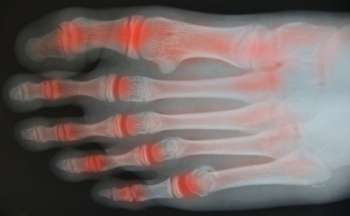 If you feel pain in the joint of your big toe, especially while you are active, it could be “big toe arthritis” or Hallux rigidus. This arthritic condition typically impacts people over age 50, is more apt to affect women, and is the most common arthritic condition of the foot. The hallux metarsal-phalangeal (MTP) joint connects the head of the first forefoot bone to the base of the first toe bone and to two tiny bones under that joint. Signs of this problem are swelling of this joint and limited movement and bending of the big toe. A bump, like a bunion or bone spur, can develop on the top of this toe joint, which can get further aggravated by rubbing against the inside of a shoe. Causes for this condition are not known, however prior injury to the big toe, differences in foot anatomy, and genetics can play a role in its development. Treatments can range from being prescribed a rigid orthotic to a cortisone shot, and as a last resort, surgery. A podiatrist can properly diagnose and offer alternative treatments to lessen the pain associated with Hallux rigidus.
If you feel pain in the joint of your big toe, especially while you are active, it could be “big toe arthritis” or Hallux rigidus. This arthritic condition typically impacts people over age 50, is more apt to affect women, and is the most common arthritic condition of the foot. The hallux metarsal-phalangeal (MTP) joint connects the head of the first forefoot bone to the base of the first toe bone and to two tiny bones under that joint. Signs of this problem are swelling of this joint and limited movement and bending of the big toe. A bump, like a bunion or bone spur, can develop on the top of this toe joint, which can get further aggravated by rubbing against the inside of a shoe. Causes for this condition are not known, however prior injury to the big toe, differences in foot anatomy, and genetics can play a role in its development. Treatments can range from being prescribed a rigid orthotic to a cortisone shot, and as a last resort, surgery. A podiatrist can properly diagnose and offer alternative treatments to lessen the pain associated with Hallux rigidus.
Arthritis can be a difficult condition to live with. If you are seeking treatment, contact one of our podiatrists from The Podiatry Center, PC. Our doctors can provide the care you need to keep you pain-free and on your feet.
Arthritic Foot Care
Arthritis is a joint disorder that involves the inflammation of different joints in your body, such as those in your feet. Arthritis is often caused by a degenerative joint disease and causes mild to severe pain in all affected areas. In addition to this, swelling and stiffness in the affected joints can also be a common symptom of arthritis.
In many cases, wearing ill-fitting shoes can worsen the effects and pain of arthritis. Wearing shoes that have a lower heel and extra room can help your feet feel more comfortable. In cases of rheumatoid arthritis, the arch in your foot may become problematic. Buying shoes with proper arch support that contour to your feet can help immensely.
Alleviating Arthritic Pain
- Exercises that stretch the foot can prevent further pain and injury and increase mobility
- Most of the pain can be alleviated with anti-inflammatory drugs, heat, and topical medications
- Massages can help temporarily alleviate pain.
It is best to see your doctor for the treatment that is right for your needs and symptoms. Conditions vary, and a podiatrist can help you determine the right method of care for your feet.
If you have any questions, please feel free to contact our office located in Millburn, NJ . We offer the newest diagnostic tools and technology to treat your foot and ankle needs.


